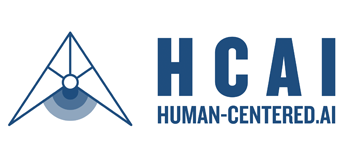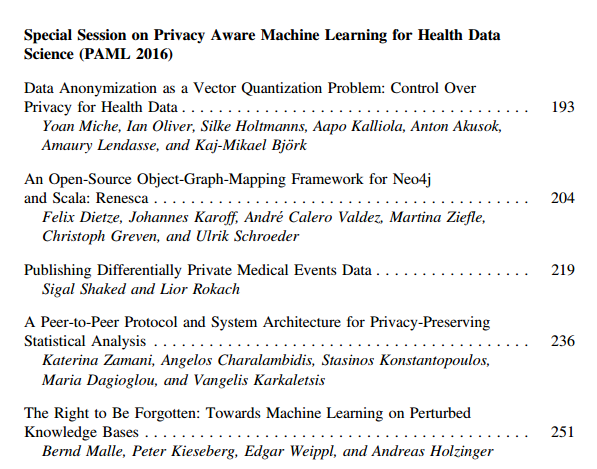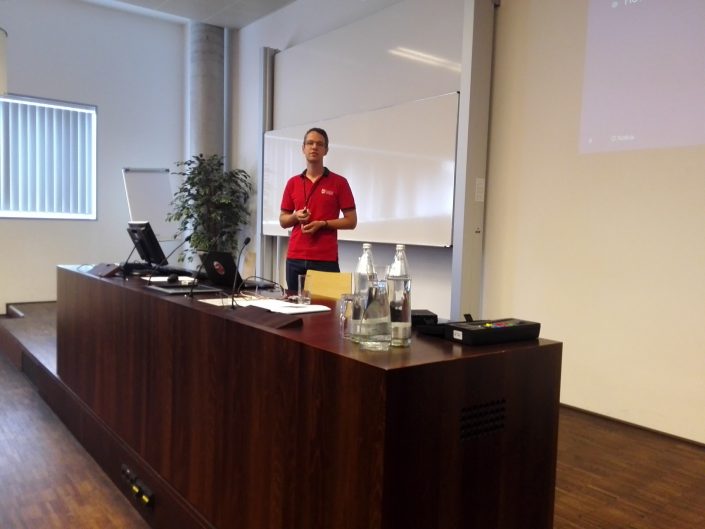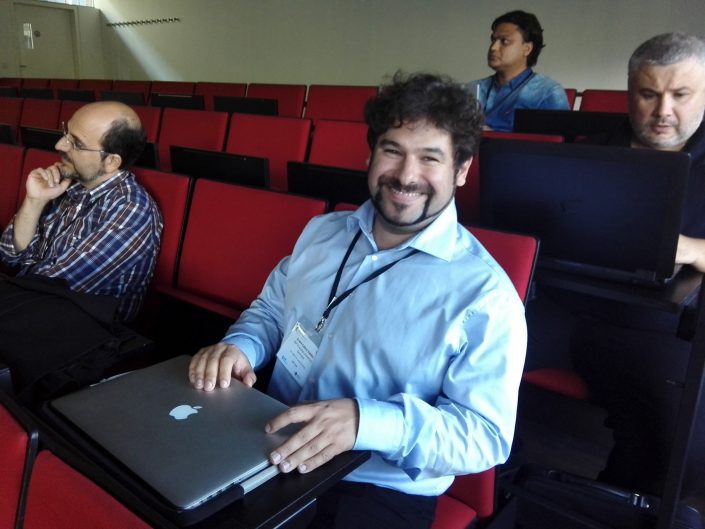Privacy Aware Machine Learning (PAML)
for Health Data Science is part of CD-MAKE the IFIP Cross Domain
Conference for Machine Learning & Knowledge Extraction
https://cd-make.net
Machine learning is the fastest growing field in computer science [Jordan, M. I. & Mitchell, T. M. 2015. Machine learning: Trends, perspectives, and prospects. Science, 349, (6245), 255-260], and it is well accepted that health informatics is amongst the greatest challenges [LeCun, Y., Bengio, Y. & Hinton, G. 2015. Deep learning. Nature, 521, (7553), 436-444 ], e.g. large-scale aggregate analyses of anonymized data can yield valuable insights addressing public health challenges and provide new avenues for scientific discovery [Horvitz, E. & Mulligan, D. 2015. Data, privacy, and the greater good. Science, 349, (6245), 253-255]. Privacy is becoming a major concern for machine learning tasks, which often operate on personal and sensitive data. Consequently, privacy, data protection, safety, information security and fair use of data is of utmost importance for health data science.
Background of the PAML Session
The amount of patient-related data produced in today’s clinical setting poses many challenges with respect to collection, storage and responsible use. For example, in research and public health care analysis, data must be anonymized before transfer, for which the k-anonymity measure was introduced and successively enhanced by further criteria. As k-anonymity is an NP-hard problem, which cannot be solved by automatic machine learning (aML) approaches we must often make use of approximation and heuristics. As data security is not guranteed given a certain k-anonymity degree, additional measures have been introduced in order to refine results (l-diversity, t-closeness, delta-presence). This motivates methods, methodologies and algorithmic machine learning approaches to tackle the problem. As the resulting data set will be a tradeoff between utility, usability and individual privacy and security, we need to optimize those measures to individual (subjective) standards. Moreover, the efficacy of an algorithm strongly depends on the background knowledge of an potential attacker as well as the underlying problem domain. One possible solution is to make use of interactive machine learning (iML) approaches and put a human-in-the-loop where the central question remains open: “could human intelligence lead to general heuristics we can use to improve heuristics?”
Research topics covered by this special session include but are not limited to the following topics:
– Production of Open Data Sets
– Synthetic data sets for learning algorithm testing
– Privacy preserving machine learning, data mining and knowledge discovery
– Data leak detection
– Data citation
– Differential privacy
– Anonymization and pseudonymization
– Securing expert-in-the-loop machine learning systems
– Evaluation and benchmarking
This special session will bring together scientists with diverse background, interested in both the underlying theoretical principles as well as the application of such methods for practical use in the biomedical, life sciences and health care domain. The cross-domain integration and appraisal of different fields will provide an atmosphere to foster different perspectives and opinions; it will offer a platform for novel crazy ideas and a fresh look on the methodologies to put these ideas into business.
Accepted Papers will be published in a Springer Lecture Notes in Computer Science LNCS Volume.
We are planning to invite excellent contributions for extension in journals (Springer MACH, BMC MIDM)
Schedule:
1) Deadline for submissions: April, 1, 2017
Paper submission via:
https://cd-ares-conference.eu/?page_id=43
2) Notification: May, 1, 2017
3) Camera Ready deadline: June, 1, 2017
4) Special Session: September, 1, 2017
> Conference Venue: Universita Mediterrranea di Reggio Calabria
> Information Reggio
> Lonely Planet Reggio
The International Scientific Committee – consisting of experts from the international expert network HCI-KDD dealing with area (7), privacy, data protection, safety and security and additionally invited international experts will ensure the highest possible scientific quality, each paper will be reviewed by at least three reviewers (the paper acceptance rate of the last special session was 35 %).
International Scientific committee:
- Elisa BERTINO, Department of Computer Science, Purdue University, West Lafayette, IN, US
(1, 7) <database systems, computer security, data privacy> - Michele BEZZI, Securtiy Research, SAP Labs France, Mougins, FR
(7) <privacy, security> - Igor BILOGREVIC, Google Research Zurich, CH
(1, 2, 6, 7) <machine learning, privacy, security, user expierence, contextual intelligence> - Rainer BOEHME, Security and Privacy Lab, Institute of Computer Science, Innsbruck University, AT
(7) <privacy, information security, digital forensics, privacy-enhancing technology> - Malin BRADLEY, Health Information Privacy Lab, Health Data Science Center, Vanderbilt University, Nashville, TN, US
(1, 2, 7) <data mining, electronic medical records, genomics, privacy, trustworthy computing> - Francesco BUCCAFURRI, Security and Social Networks Group, Universita Mediterranea die Reggio Calabria, IT
(1, 3, 7) <Social Networks, Information security and privacy, artificial intelligence> - Srdjan CAPKUN, System Security Group, Institut für Informationssicherheit, ETH Zürich, CH
(1, 7) <Computer Security, Information Security, Networking, Wireless Security, Privacy> - Kamalika CHAUDHURI, Machine Learning Group, Computer Science Engineering, University of California, San Diego, CA, US
(2, 7) <machine learning, privacy, online learning, active learning, unsupervised learning> - Krzysztof J CIOS, Data Mining and Biomedical Informatics Lab, Dept. of Computer Science, VCU, Richmond, US
(1, 2, 7) <data mining, machine learning, computational neuroscience, biomedical informatics, privacy> - Chris CLIFTON, Department of Computer Science, Purdue University, West Lafayette, IN, US
(1, 2, 7) <data mining, statistics, privacy> - Josep DOMINGO-FERRER, UNESCO Chair in Data Privacy, Universitat Rovira i Virgili, Tarragona, ES
(7) <data privacy, data security, statistical disclosure control, cryptography> - Kuda DUBE, School of Engineering and Advanced Technology, Massey University New Zealand, Palmerston, NZ
(1, 2, 7) <knowledge engineering, health, nutrition and bio-informatics, computer security and privacy> - Isao ECHIZEN, Digital Content and Media Sciences Research Division, National Institute of Informatics, Tokyo, JP
(1, 7) <media security, safe and secure distribution of digital content, privacy> - Aristides GIONIS, Data Mining Group, Machine Learning, Data Mining and Probabilistic Modeling Area, Aalto Yliopisto, FI
(1, 2, 3, 7) <data mining, graph mining, social-network analysis, algorithmic data analysis, privacy> - Jihun HAMM, Department of Computer Science and Engineering, Ohio State University, Columbus, OH, US
(2, 3, 7) <privacy-preserving machine learning, medical image analysis> - Zhisheng HUANG, Department of Computer Science, Vrije University of Amsterdam, NL
(1, 2, 7) <artificial intelligence, semantic Web, logic, intelligent agents, privacy> - Prateek JAIN, Machine Learning and Optimization Group, Microsoft Research Lab Bangalore, IN
(1, 2, 7) <NLP, machine learning, privacy> - Nathalie JAPKOWICZ, Lab for Research on Machine Learning for Defense and Security, University of Ottawa, CA
(1, 2, 7) <Data Mining, Machine Learning, Artificial Intelligence, Security> - Xiaoqian JIANG, Department of Biomedical Informatics, School of Medicine, University of California San Diego, US
(2, 7) <machine learning, health privacy> - Murat KANTARCIOGLU, Data Security and Privacy Lab, University of Texas at Dallas, US
(1, 2, 7) <databases, data mining, security, privacy> - Patrick Gage KELLEY, Computer Science Department, University of New Mexico, Albuquerque, US
(6, 7) <information visualization, usability, user experience, human-computer interaction, privacy> - Haibin LING, Center for Data Analytics and Biomedical Informatics, Temple University, Philadelphia, US
(6, 7) <computer vision, medical image analysis, privacy, HCI> - Sjouke MAUW, Security and Trust of Software Systems Group, Computer Science, University of Luxembourg, LU
(1, 7) <risk management, security, trust, formal methods, security assessment, privacy> - Kazuhiro MINAMI, Institute of Statistical Mathematics, Tokyo, JP
(1, 7) <distributed systems, security and privacy> - Prateek MITTAL, Mittal Lab, Center for Information Technology Policy, Department of Electrical Engieering, Princeton, US
(1, 2, 3, 7) <systems, machine learning, network science, security and privacy> - Roberto PERDISCI, Institute for Artificial Intelligence, Computer Science Department, University of Georgia, Athens, GA, US
(1, 2, 7) <data mining, machine learning, computer and network security> - Lior ROKACH, Department of Information Systems Engineering, Ben-Gurion University of the Negev, Beer-Sheva, IL
(1, 2, 7) <machine learning, data science, machine learning, recommender systems, forecasting, cyber security> - Pierangela SAMARATI, Dipartimento die Informatica, University of Milan, Crema, IT
(7) <privacy, data security, secure cloud computing, trust management> - Bracha SHAPIRA, Department of Information Systems Engineering, Ben-Gurion University of the Negev, Eilet, IL
(1, 2, 7) <recommender systems, data mining, privacy, cyber security, personalization> - Jessica STADDON, Computer Science Department NC State University, Raleigh, US
(1, 2, 6, 7) <data mining, HCI, privacy, security> - Joaquin VANSCHOREN, Machine Learning Group, Dept. of Maths and CS, Eindhoven University of Technology, NL
(1, 2, 3, 7) <Large Scale Data Analysis, automatic machine learning, artificial intelligence> - Qian WANG, Network Information System Security & Privacy Lab, School of Computer Science, Wuhan University, CN
(1, 2, 3, 7) - Shuang WANG, Department of Biomedical Informatics, School of Medicine, University of California San Diego, US
(1, 2, 6, 7) <machine learning, GPU based high-performance computing, data privacy, channel/source coding> - Marcel WINANDY, Huawei European Research Center, Munich, DE
(1, 7) <computer security, secure operating systems, trusted computing> - Elena ZHELEVA, University of Maryland Institute for Advanced Computer Studies, College Park, US
(1, 2, 3, 7) <machine learning, data mining, network analysis, privacy>
Call for Papers
PAML-call-for-papers-2017 (pdf, 76kB)
PAML-call-for-papers-2017 (Word docx 41 kB)
PAML-call-for-papers-2017 (txt 4 kB)
cfp in wikicfp
Technical Program from PAML 2016 – September, 1, 2016, Session PAML I – 11:30 – 13:00
Speaker #1: Yoan MICHE, Nokia Bell Labs, Helsinki, FI
Data Anonymization as a Vector Quantization Problem: Control Over Privacy for Health Data. doi:10.1007/978-3-319-45507-5_13.
Speaker #2: Andre CALERO-VALDEZ, Ziefle-Group RWTH Aachen, DE
An Open-Source Object-Graph-Mapping Framework for Neo4j and Scala: Renesca. doi:10.1007/978-3-319-45507-5_14.
Technical Program September, 1, 2016, Session PAML II – 14:00 – 16:00
Speaker #3: Sigal SHAKED, Rokach Group, Department of Information Systems Engineering, Ben Gurion University, IL
Publishing Differentially Private Medical Events Data. doi:10.1007/978-3-319-45507-5_15
Speaker #4: Katerina ZAMANI, Institute and Informatics and Telecommunications, NCSR Demokritos, GR
A Peer-to-Peer Protocol and System Architecture for Privacy-Preserving Statistical Analysis. doi:10.1007/978-3-319-45507-5_16
Speaker #5: Bernd MALLE, Holzinger Group HCI-KDD, Institute for Medical Informatics, Medical University Graz, AT
Towards Machine Learning on Perturbed Knowledge Bases. doi:10.1007/978-3-319-45507-5_17





















